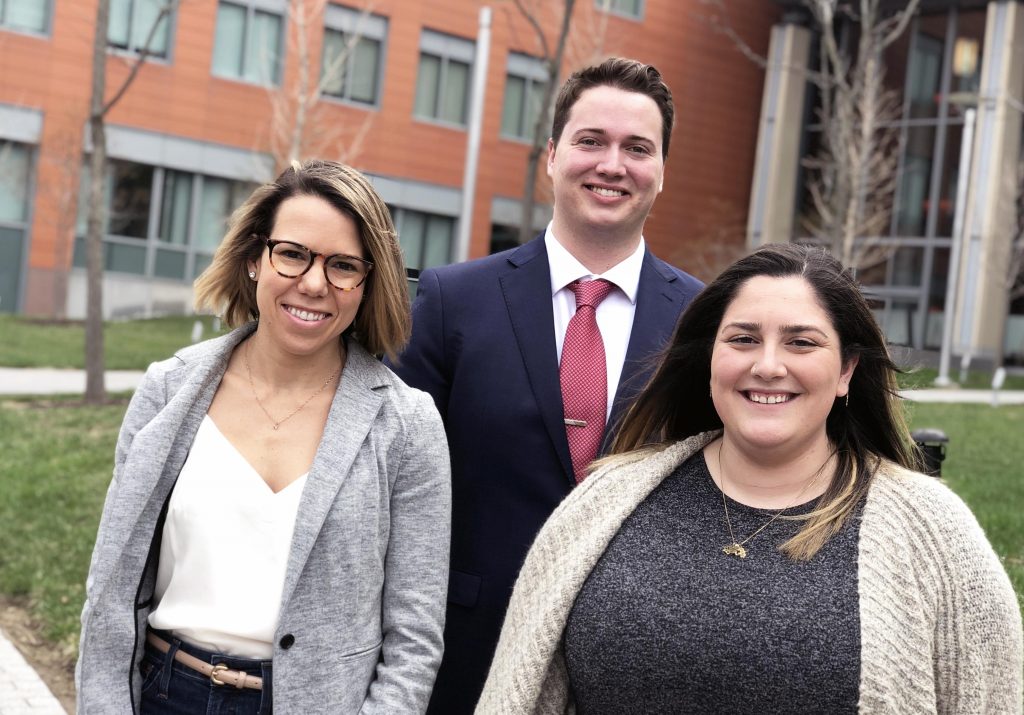Syracuse University graduate students Jane Pascar, Katie Piston and Thomas Welles ’17 have been awarded 2019 National Science Foundation (NSF) Graduate Research Fellowships. This highly selective fellowship program recognizes and supports outstanding graduate students in science, technology, engineering and mathematics disciplines. Each recipient is contributing to fascinating research with the potential to benefit humanity in three distinct ways—stopping the spread of disease, treating brain injuries and reducing automobile emissions.

Pascar, a biology Ph.D. student in the Center for Reproductive Evolution (College of Arts and Sciences), studies the complex relationship between microbes and their hosts. Different factors—such as climate, or a host’s diet and habitat—can influence these microbial communities. Working with Associate Professor Steve Dorus and Weeden Professor Scott Pitnick, Pascar uses computational techniques to analyze microbial sequencing data from the world’s deadliest animal—the mosquito.
“Mosquitoes transmit diseases like malaria. Nets and insecticides decrease the number of mosquito-related illnesses, but additional solutions are still needed,” says Pascar. “Researchers are developing ways to control mosquito populations biologically. Still, there are gaps in our knowledge. By investigating the role microbes play in a mosquito’s life, I hope to contribute to more effective preventative methods to help stop the spread of dangerous diseases.”
Piston, a Tillman Scholar and bioengineering Ph.D. student in Associate Professor Shikha Nangia’s research group (College of Engineering and Computer Science), is contributing to knowledge of the degenerative brain disease chronic traumatic encephalopathy (CTE). CTE is associated with repeated head injuries, which damage blood vessels in the brain and disrupt the blood-brain barrier (BBB), a selectively permeable barrier of cells that form physical barriers called tight junctions. The BBB lines the brain’s more than 400 miles of microvasculature and prevents potentially harmful chemicals in the bloodstream from entering the brain.
“CTE is a growing health crisis for our nation’s veterans and contact sport athletes. Since 9/11, more than 300,000 veterans have returned home with brain injuries,” explains Piston. “I am developing a computational model of tight junctions that have been disrupted by head injuries to fill in the knowledge gap between CTE and BBB dysfunction. Ultimately, our contributions could help uncover better treatments for brain injuries.”
Thomas Welles ’17, a mechanical and aerospace Ph.D. engineering student in Associate Professor Jeongmin Ahn’s Combustion and Energy Research Lab (Engineering and Computer Science), seeks to increase the efficiency and fuel economy of traditional internal combustion engine vehicles. Today’s engines rely on catalytic converters to reduce emissions. Welles’ hybrid system replaces the catalytic converter and alternator system with a solid oxide fuel cell stack to produce electric power and cleaner emissions.
“The auto industry is faced with producing vehicles with the lowest possible environmental emissions, but they are still mostly building vehicles that solely burn fossil fuels,” says Welles. “With our fuel cell research, we may be able to reduce emissions more than any current technology.”
The NSF also recognized two additional Syracuse students with honorable mentions: Julia Giannini (Arts and Sciences), for her physics of living systems research with Associate Professor M. Lisa Manning, and Lucie Worthen (Engineering and Computer Science), for her environmental engineering research. Worthen is co-advised by Thomas C. and Colleen L. Wilmot Professor Cliff I. Davidson and Assistant Professor Christa Kelleher.
The NSF awards about 2,000 new fellowships and 1,500 honorable mention recipients annually from more than 12,000 applicants. In addition to notable recognition, each fellow is provided three years of financial support in the form of a substantial stipend. The University also receives a cost-of-education allowance for each fellow. Honorable mention is considered a significant national academic achievement.
The complete list of 2019 fellows and honorable mention recipients is available at www.nsfgrfp.org.
